====================
This sermon was preached on Sunday, September 9, 2012, at St. Paul’s Episcopal Church, Medina, Ohio, where Fr. Funston is rector.
(Revised Common Lectionary, Proper 18B: Isaiah 35:4-7a; Psalm 146; James 2:1-17; and Mark 7:24-37.)
====================
 If you are a political junkie like me, you’ve been following the campaigns, watching the conventions, reading the editorials, and generally getting angry with one side or the other or both and the whole process. You may have noticed, as I have, that candidates are never alone. They are surrounded by a whole corps, an entire gaggle of handlers, some of whom have the responsibility to make sure the candidate stays “on message”, that he or she makes no “gaffs”. Jesus was surrounded by a gaggle, as well, but these were not handlers and there was no one to keep him “on message” except himself. In fact, the gospel witness is pretty clear that even right up to the end the gaggle that followed him around really didn’t understand the message!
If you are a political junkie like me, you’ve been following the campaigns, watching the conventions, reading the editorials, and generally getting angry with one side or the other or both and the whole process. You may have noticed, as I have, that candidates are never alone. They are surrounded by a whole corps, an entire gaggle of handlers, some of whom have the responsibility to make sure the candidate stays “on message”, that he or she makes no “gaffs”. Jesus was surrounded by a gaggle, as well, but these were not handlers and there was no one to keep him “on message” except himself. In fact, the gospel witness is pretty clear that even right up to the end the gaggle that followed him around really didn’t understand the message!
To be honest, it’s not clear in today’s lesson whether the gaggle is even around. Mark doesn’t say anything about them and the way he writes this story it sounds like Jesus may have gone without them to the city of Tyre, a gentile town north of the sea of Galilee and on the Mediterranean coast in what is now Lebanon. But whether they were with him or not, he doesn’t have anyone there who can stop him making a really awful racist gaff, from calling this foreign woman “a dog”! O.M.G.! Can you imagine what Fox News or MSNBC would have done with this?
Gentle Jesus, meek-and-mild Jesus, love-everyone Jesus, welcome-the-sinner Jesus has just said about the worst, most insulting, most awful thing he could say to a woman who wanted nothing more than to get medical help for her daughter! And make no mistake about it, that is what he has done. He has uttered a racial slur!
Immediately we want to say, “That can’t be! Jesus couldn’t possibly have been racist!” But Mark’s story of Jesus’ encounter with this Syrophoenician woman says otherwise. Jesus has called this woman, who simply wants a cure for her child, a dog, a dehumanizing ethnic slur common at the time. We can do some theological dancing, some interpretive two-step to avoid this uncomfortable reality, but eventually we have to face the truth. Jesus, with no handlers nearby to stop him making a “gaff”, has uttered a racial insult.
The difficulty of this passage is that we, as 21st Century Christians, want Jesus to be the simple, easy answer to all of our problems and to all of society’s problems. When faced with the problem of racism, whether personal or institutional, we would prefer to think of Jesus as always loving all people regardless of skin color or ethnicity. But Jesus the First Century Palestinian Jew doesn’t give us those easy 21st Century answers. He had a real life and real feelings. He was born and reared in a real culture with all of its trappings.
As a good Jewish man, Jesus would have given thanks daily that he was born a Jew not a Gentile, a man not a woman. He would have said the siddur prayer every day, one version of which praises God “. . . who has created me a human and not beast, a man and not a woman, an Israelite and not a gentile, circumcised and not uncircumcised, free and not slave.” (From the Cairo Genizah.) Even the best of humanity, the Incarnation himself, could get entangled in the sexist and racist snare of this tradition, could get caught up in its inherent system of oppression, its culture of supremacy.
The great lesson of his encounter with the Syrophoenician woman is that it teaches us how the cultural dynamics of racism, of prejudice of any kind, can be overcome in a real moment of conversion. Jesus’ understanding of what he was called to do was changed and expanded because of this gentile woman’s challenge. From that moment, he moved forward, and went about his work with an expanded awareness of who the Good News was for, healing the woman’s daughter and then going deeper into gentile territory.
Mark masterfully combines this story with the tale of healing the man with the speech impediment which seems also to have taken place in gentile territory. Mark writes that Jesus returned to the Sea of Galilee by way of Sidon; if you look at a map, that makes no sense. The Galilean Lake is south of Tyre and inland; Sidon is a considerable distance north of Tyre and on the coast. Like Tyre, it was and is a gentile settlement. The way Mark tells the story it may have been here that Jesus restored the hearing of the man with impeded speech. Mark combines the stories because because the second story explains the first. Jesus metaphorical ears, his ethnic or socio-political ears (if you will) were opened by the woman in the same manner that the deaf man’s physical ears were opened by Jesus. That Jesus went deeper into gentile territory and there healed the deaf man, probably himself a gentile, shows the impact of the woman’s words on Jesus. The man’s ears were opened by Jesus, his tongue was loosened, and he no longer spoke his slurred speech; Jesus’ “ears” were opened by the woman, his traditional upbringing was loosened, and he no longer uttered ethnic slurs.
What is noticeable about both “healings” is their surprising quickness. The Syrophoenician woman challenges Jesus and in a single instant of profound grace his heart is changed; Jesus speaks a single word and in an instant of profound grace the man’s ears are unstopped and his speech restored. These gospel stories of sudden and immediate transformation are combined for us today with a short lesson from the prophet Isaiah who likens the coming of God’s power, the time when the ears of the deaf will be opened and the eyes of the blind will be given sight, to one of the briefest moments in the desert, that time when the spring rains come and the desert quickly blooms.
There’s nothing quite like springtime in the desert! One is never sure when it will happen but one spring day a storm moves in and for a few hours the dry burning sands are covered with pools, the thirsty ground runs with streams that rush through the desert often to the point of dangerous flooding. In just a few more hours, the wilderness blooms with an intensity that truly has to be seen to be appreciated. Around my hometown of Las Vegas, the spring rains produce an incredible variety of blossoms. There are all sorts of different yellows: bear poppy, bristly fiddleneck, buttercups, and desert dandelion, to name a few. There are vivid pinks: beardtongue and arrowweed and the mojave thistle. There’s a red-spotted purple flower called “desert five spot”. There’s a flower called “desert bell” that is the most vivid blue you’ve ever seen and, of course, there are the red-orange California poppies all over the place. It’s just incredible! And it happens almost instantaneously and then, in just a few hours, the desert goes dry again . . . and the brilliant rainbow of desert color is gone, but for that brief moment the desert has been transformed and, truly, it will never be the same again.
Isaiah tells us that that is precisely the way the power of God comes, with that same sort of startling swiftness, in a moment of magnificent immediacy. That’s the way new hearing and new understanding came to the deaf man and, surprisingly, to Jesus, as well. And that’s the way it comes to us. We may study Scripture for years; that’s a good thing to do and we gain knowledge and understanding that way. But it is not through that study that we are transformed. We may attend worship services weekly or even daily; that’s a good thing to do and we show our love of God in that way. But it is not through liturgy that we are transformed. We may regularly give of our time and talent in ministry to the poor; that’s a good thing to do and we serve Christ in others in that way. But it is not through that service that we are transformed. It is, rather, through the swift and surprising in-breaking of God’s power and Spirit that we are transformed! And it is through that transformation that we are empowered to serve with new vigor, to worship with new thanksgiving, to read Scripture with new understanding.
Isaiah assures us that when the waters of God’s power break forth in the wilderness of our lives, when the streams of God’s Spirit flow through the deserts of our existence, then the burning sands of our souls become pools, the thirsty ground of our hearts become springs of living water. Through the words of the Syrophoenician woman it happened to Jesus; through the ministry of Jesus it happened to the man with the speech impediment; and through the power of the Holy Spirit it happens to us. The writer of the letter to the Hebrews declares that God in Jesus became like us “his brothers and sisters in every respect” that he might be “the pioneer and perfecter of our faith” (Heb. 2:17, 12:2) so that, as John says, “we will be like him!” (1 John 3:2) It happens in an instant, like the transformation of the desert in the spring rains or, as Paul said, “in the twinkling of an eye.” (1 Cor. 15:42)
Let us pray:
Almighty and merciful God, how wonderfully you created us and still more wonderfully transform us. In moments of surprising grace, you send your Holy Spirit into our hearts to reform our lives; you constantly renew us through your redeeming love, refreshing us as rain refreshes the wilderness. We thank you for the wondrous streams of your mercy, for the pools of your love, for the water of life which restores our parched spirits and transforms us ever more closely into the likeness of your Son, through whom in the power of the Holy Spirit, we join with the whole Church to give you praise, now and for ever. Amen.
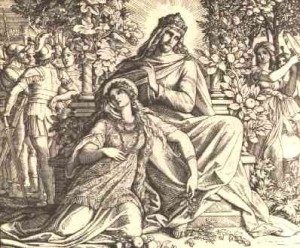 I want you for just a minute to close your eyes. Just sit back and relax, and imagine that you are hearing not my voice, but the voice of your beloved, the voice of the one person in this world who loves you more than any other . . . .
I want you for just a minute to close your eyes. Just sit back and relax, and imagine that you are hearing not my voice, but the voice of your beloved, the voice of the one person in this world who loves you more than any other . . . . 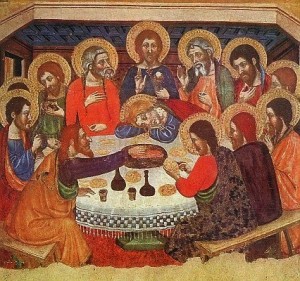 The Jews, John tells us, disputed among themselves as Jesus was delivering the lengthy dissertation on bread from which these statements come. Earlier he had introduced this idea that his flesh was bread to be eaten by his followers: “I am the living bread that came down from heaven. Whoever eats of this bread will live for ever; and the bread that I will give for the life of the world is my flesh.” (v. 51) The very idea of consuming human flesh is off-putting, even disgusting, and would have been extremely objectionable to the Jews; no wonder they grumbled and mumbled, complained and disputed. Even as a metaphor, the statement demands a lot from Jesus’ followers!
The Jews, John tells us, disputed among themselves as Jesus was delivering the lengthy dissertation on bread from which these statements come. Earlier he had introduced this idea that his flesh was bread to be eaten by his followers: “I am the living bread that came down from heaven. Whoever eats of this bread will live for ever; and the bread that I will give for the life of the world is my flesh.” (v. 51) The very idea of consuming human flesh is off-putting, even disgusting, and would have been extremely objectionable to the Jews; no wonder they grumbled and mumbled, complained and disputed. Even as a metaphor, the statement demands a lot from Jesus’ followers!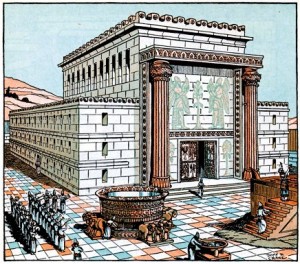 On the cover of our worship bulletin this morning is a depiction of King Solomon’s Temple. It’s an artist’s rendering of someone’s reconstruction of the Temple based on the description of its construction in the Old Testament record. Our first reading today (from the First Book of Kings), as long as it was, is just a small part of the dedicatory prayer that King Solomon offers when the Temple is finished and consecrated.
On the cover of our worship bulletin this morning is a depiction of King Solomon’s Temple. It’s an artist’s rendering of someone’s reconstruction of the Temple based on the description of its construction in the Old Testament record. Our first reading today (from the First Book of Kings), as long as it was, is just a small part of the dedicatory prayer that King Solomon offers when the Temple is finished and consecrated.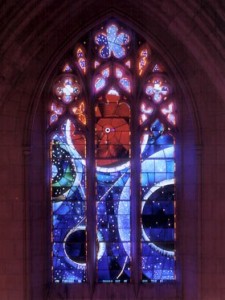 Where were you on July 20, 1969? In July of 1969 I was living in a boarding house and studying in Florence, Italy. The boarding house or pensione in which I lived, Pensione Frati, did not have a television. My landlord, Colonello Roberto Frati, arranged for me and the other Americans living there to go to his sister-in-law’s home where we could watch Neil Armstrong’s and Buzz Aldrin’s moon landing on her TV – this great big box of a television set with a tiny black-and-white screen. We all gathered around that box peering into that tiny screen listening to the Italian news commentators and struggling to hear the American commentary behind them. I’m sure that when we heard of Commander Armstrong’s death we all thought about wherever we were on that day at that moment when he stepped out of the lunar lander and became the first human being to walk on another world.
Where were you on July 20, 1969? In July of 1969 I was living in a boarding house and studying in Florence, Italy. The boarding house or pensione in which I lived, Pensione Frati, did not have a television. My landlord, Colonello Roberto Frati, arranged for me and the other Americans living there to go to his sister-in-law’s home where we could watch Neil Armstrong’s and Buzz Aldrin’s moon landing on her TV – this great big box of a television set with a tiny black-and-white screen. We all gathered around that box peering into that tiny screen listening to the Italian news commentators and struggling to hear the American commentary behind them. I’m sure that when we heard of Commander Armstrong’s death we all thought about wherever we were on that day at that moment when he stepped out of the lunar lander and became the first human being to walk on another world.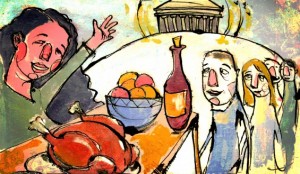
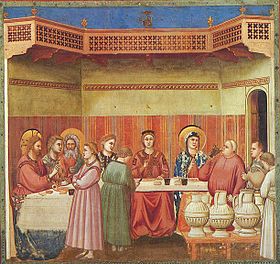 A year ago I was in Ireland, camped out in a cottage outside of the village of Banagher, County Offaly, on sabbatical. As my study project, I was translating old Irish hymns into metrical, rhyming English such that they could be sung to the music of the original. The hymns were published in the early 20th Century in a collection titled Dánta Dé Idir Sean agus Nuadh compiled by Uná ní Ógáin. Dánta Dé includes a communion hymn which elaborates on John’s story of the wedding feast; it is entitled The Blessed Wedding at Cana and is attributed to Maighréad ní Annagáin. I found I could not directly translate the hymn, so instead I wrote a poem of my own. Reading this story today, I recall working on that piece and offer it again.
A year ago I was in Ireland, camped out in a cottage outside of the village of Banagher, County Offaly, on sabbatical. As my study project, I was translating old Irish hymns into metrical, rhyming English such that they could be sung to the music of the original. The hymns were published in the early 20th Century in a collection titled Dánta Dé Idir Sean agus Nuadh compiled by Uná ní Ógáin. Dánta Dé includes a communion hymn which elaborates on John’s story of the wedding feast; it is entitled The Blessed Wedding at Cana and is attributed to Maighréad ní Annagáin. I found I could not directly translate the hymn, so instead I wrote a poem of my own. Reading this story today, I recall working on that piece and offer it again. It is intriguing how often in stories of Holy Scripture food plays a role. From the “apple” in the Garden, to Abraham offering a meal of cakes and meat to the three men (who turn out to God) at the Oaks of Mamre, to this story of Gideon, to David and his men eating the Bread of the Presence, to all the food items listed as items of sacrifice in Leviticus, the Old Testament (indeed, the whole Bible) is food focused. The People of God define themselves through the annual reenactment of a ritual meal celebrating the Passover; the new People of God define themselves (in my tradition and others) by the weekly reenactment of a ritual meal celebrating the death and Resurrection of Christ and anticipating his return. It’s intriguing but not surprising. The Jewish and Christian faiths are not, in the long run, about following rules of ritual or moral conduct; they are about being in an intimate relationship with that which is the source of being, that which we call “God” and address as “Father” or brother or redeemer. And, other than sex, there is probably no more intimate activity two or more people can share than eating together.
It is intriguing how often in stories of Holy Scripture food plays a role. From the “apple” in the Garden, to Abraham offering a meal of cakes and meat to the three men (who turn out to God) at the Oaks of Mamre, to this story of Gideon, to David and his men eating the Bread of the Presence, to all the food items listed as items of sacrifice in Leviticus, the Old Testament (indeed, the whole Bible) is food focused. The People of God define themselves through the annual reenactment of a ritual meal celebrating the Passover; the new People of God define themselves (in my tradition and others) by the weekly reenactment of a ritual meal celebrating the death and Resurrection of Christ and anticipating his return. It’s intriguing but not surprising. The Jewish and Christian faiths are not, in the long run, about following rules of ritual or moral conduct; they are about being in an intimate relationship with that which is the source of being, that which we call “God” and address as “Father” or brother or redeemer. And, other than sex, there is probably no more intimate activity two or more people can share than eating together. How many of you have ever attended a potluck supper or potluck luncheon in this parish? Let’s have show of hands. OK – hands down. Those of you who have done so . . . have you ever known there to be an insufficiency of food at any such event? Ever? Keep that in mind, please, as we take a look at these lessons today.
How many of you have ever attended a potluck supper or potluck luncheon in this parish? Let’s have show of hands. OK – hands down. Those of you who have done so . . . have you ever known there to be an insufficiency of food at any such event? Ever? Keep that in mind, please, as we take a look at these lessons today. In our lessons today, we have two stories about silencing the prophetic voice. First, a snippet of the not-very-familiar story of the Prophet Amos which is, frankly, cut from its context so badly that some explanation really is necessary. Second, the almost-too-familiar story of the beheading of John the Baptizer.
In our lessons today, we have two stories about silencing the prophetic voice. First, a snippet of the not-very-familiar story of the Prophet Amos which is, frankly, cut from its context so badly that some explanation really is necessary. Second, the almost-too-familiar story of the beheading of John the Baptizer.  Our first reading this morning is from a little book from the Apocrypha called The Book of Wisdom. At one time church tradition ascribed authorship to King Solomon, but it is now believed to have been written sometime in the first or second century before Christ by a Greek-speaking Jew of the Diaspora. It is found in the Greek-language version of Jewish scriptures, not in the Hebrew version, and is therefore not considered as canonical scripture by Jews or by Protestants. Roman Catholics and the Eastern Orthodox do accept it, and we Anglicans take a middle course, saying that we read them “for example of life and instruction of manners; but yet [we do] not apply them to establish any doctrine.” (Articles of Religion, Art. VI, BCP 1979, pg. 868). Well, here’s an example of life, then:
Our first reading this morning is from a little book from the Apocrypha called The Book of Wisdom. At one time church tradition ascribed authorship to King Solomon, but it is now believed to have been written sometime in the first or second century before Christ by a Greek-speaking Jew of the Diaspora. It is found in the Greek-language version of Jewish scriptures, not in the Hebrew version, and is therefore not considered as canonical scripture by Jews or by Protestants. Roman Catholics and the Eastern Orthodox do accept it, and we Anglicans take a middle course, saying that we read them “for example of life and instruction of manners; but yet [we do] not apply them to establish any doctrine.” (Articles of Religion, Art. VI, BCP 1979, pg. 868). Well, here’s an example of life, then:

